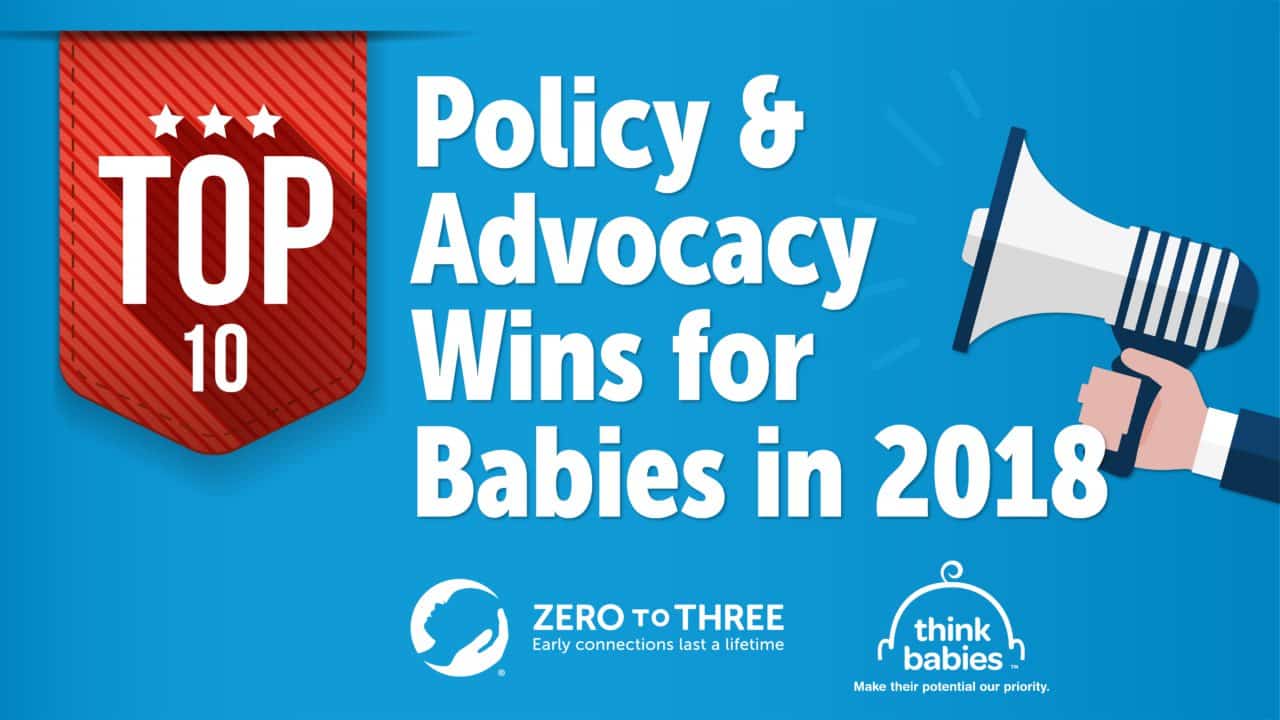Despite uncertainty this year, federal and state policymakers made progress for babies.
At the beginning of this past year, programs that provide babies and their families with vital support faced recurring uncertainty. Yet infant-toddler advocates showed up on Capitol Hill and in state capitals across the country to urge their leaders to prioritize babies. As we look back on 2018, ZERO TO THREE is excited to celebrate some big wins for our little ones, including:
- Congress made a clear investment in the country’s future by prioritizing early learning programs in spending bills covering two fiscal years finalized in 2018. The FY 2018 spending bill nearly doubled the Child Care and Development Block Grant (CCDBG). With this increase, states received a total of $5.8 billion in new funds for FY 2018 and FY 2019. Head Start and Early Head Start also benefited from increased investments totaling $800 million for the two fiscal years. $165 million was designated for the expansion of Early Head Start and Early Head Start-Child Care Partnership grants.
- ZERO TO THREE launched partnerships with leading children’s organizations to bring Think Babies™ and Strolling Thunder™ to six states across the country. Partners in Colorado, Georgia, New Jersey, North Carolina, Rhode Island, and Washington state are bringing together stakeholders from across the public and private sectors to advance policies that ensure babies and families have what they need to thrive
- Congress passed the Family First Prevention Services Act, taking an important step toward better supporting the well-being of infants and toddlers in the child welfare system. The legislation allows funds that were only available for foster care payments to be used to keep families together.
- Throughout the year, several states made comprehensive commitments to their youngest constituents. Washington, D.C. passed the Birth-to-Three for All DC Act, offering a roadmap for creating a birth-three system of supports. And, Illinois’ budget included a $50 million increase to expand and improve birth-to-five programs and services.
- ZERO TO THREE’s second annual Strolling Thunder event brought babies and families from all 50 states and the District of Columbia to Washington, DC to urge Congress to Think Babies. Families met with their Members of Congress to share what babies need to thrive: quality, affordable child care, time for parents to bond with their babies, healthy emotional development, and strong physical health and nutrition.
- Massachusetts passed its Paid Family and Medical Leave Law, providing eligible employees with 12 weeks of paid leave. The state joins five others across the country to implement this type of legislation.
- The bipartisan budget deal passed by Congress included an extension of the Maternal, Infant, and Early Childhood Home Visiting (MIECHV) program, with funding of $400 million a year for five years. Established in 2010, MIECHV enhances state efforts to create strong systems of services that meet families’ needs through home visiting.
- Over the summer, several states also strengthened their investments in home visiting programs. California set aside $158 million for a new Temporary Assistance for Needy Families Home Visiting Initiative; and Pennsylvania budgeted for a $6.7 million increase to strengthen home visiting services.
- Congress extended the Children’s Health Insurance Program (CHIP) for a total of 10 years, putting the program on much sounder footing. CHIP complements Medicaid by providing funds to states for health insurance coverage of children whose family income is too high to qualify for Medicaid.
- New York provided new funding to support implementation of the state’s First 1,000 Days on Medicaid plan, aimed at improving the health and development of the nearly 60% of infants and toddlers covered by Medicaid in the state.
As we look to 2019, with officials starting their new terms in Congress, governors’ mansions, and state legislatures in January, we have a prime opportunity to make each and every one of them a champion for babies. Through the collective voice of advocates, like you, we can continue to push policymakers to help us prioritize babies and families – and our future.



